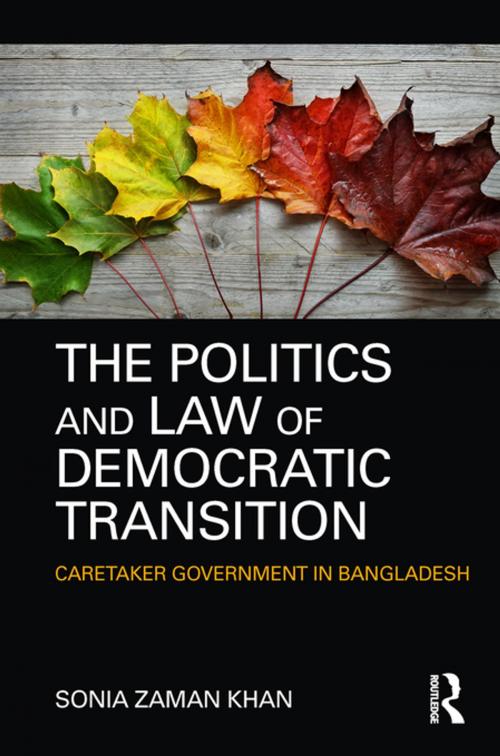The Politics and Law of Democratic Transition
Caretaker Government in Bangladesh
Nonfiction, Reference & Language, Law, Comparative, Constitutional| Author: | Sonia Zaman Khan | ISBN: | 9781351860246 |
| Publisher: | Taylor and Francis | Publication: | October 25, 2017 |
| Imprint: | Routledge | Language: | English |
| Author: | Sonia Zaman Khan |
| ISBN: | 9781351860246 |
| Publisher: | Taylor and Francis |
| Publication: | October 25, 2017 |
| Imprint: | Routledge |
| Language: | English |
Peaceful legal and political ‘changing of the guards’ is taken for granted in developed democracies, but is not evident everywhere. As a relatively new democracy, marred by long periods of military rule, Bangladesh has been encountering serious problems because of a prevailing culture of mistrust, weak governance institutions, constant election manipulation and a peculiar socio-political history, which between 1990 and 2011 led to a unique form of transitional remedy in the form of an unelected neutral ‘caretaker covernment’ (CTG) during electoral transitions.
This book provides a contextual analysis of the CTG mechanism including its inception, operation, manipulation by the government of the day and abrupt demise. It queries whether this constitutional provision, even if presently abolished after overseeing four acceptable general elections, actually remains a crucial tool to safeguard free and fair elections in Bangladesh. Given the backdrop of the culture of mistrust, the author examines whether holding national elections without a CTG, or an umpire of some kind, can settle the issue of credibility of a given government.
The book portrays that even the management of elections is a matter of applying pluralist approaches. Considering the historical legacy and contemporary political trajectory of Bangladesh, the cause of deep-rooted mistrust is examined to better understand the rationale for the requirement, emergence and workings of the CTG structure.
The book unveils that it is not only the lack of nation-building measures and governments’ wish to remain in power at any cost which lay behind the problems that Bangladesh faces today. Part of the problem is also the flawed logic of nation-building on the foundation of Western democratic norms which may be unsuitable in a South Asian cultural environment. Although democratic transitions, on the crutch of the CTG, have been useful in moments of crisis, its abolition creates the need for a new or revised transitional modality – perhaps akin to the CTG ethos – to oversee electoral governance, which will have to be renegotiated by the polity based on the people’s will.
The book provides a valuable resource for researchers and academics working in the area of constitutional law, democratic transition, legal pluralism and election law.
Peaceful legal and political ‘changing of the guards’ is taken for granted in developed democracies, but is not evident everywhere. As a relatively new democracy, marred by long periods of military rule, Bangladesh has been encountering serious problems because of a prevailing culture of mistrust, weak governance institutions, constant election manipulation and a peculiar socio-political history, which between 1990 and 2011 led to a unique form of transitional remedy in the form of an unelected neutral ‘caretaker covernment’ (CTG) during electoral transitions.
This book provides a contextual analysis of the CTG mechanism including its inception, operation, manipulation by the government of the day and abrupt demise. It queries whether this constitutional provision, even if presently abolished after overseeing four acceptable general elections, actually remains a crucial tool to safeguard free and fair elections in Bangladesh. Given the backdrop of the culture of mistrust, the author examines whether holding national elections without a CTG, or an umpire of some kind, can settle the issue of credibility of a given government.
The book portrays that even the management of elections is a matter of applying pluralist approaches. Considering the historical legacy and contemporary political trajectory of Bangladesh, the cause of deep-rooted mistrust is examined to better understand the rationale for the requirement, emergence and workings of the CTG structure.
The book unveils that it is not only the lack of nation-building measures and governments’ wish to remain in power at any cost which lay behind the problems that Bangladesh faces today. Part of the problem is also the flawed logic of nation-building on the foundation of Western democratic norms which may be unsuitable in a South Asian cultural environment. Although democratic transitions, on the crutch of the CTG, have been useful in moments of crisis, its abolition creates the need for a new or revised transitional modality – perhaps akin to the CTG ethos – to oversee electoral governance, which will have to be renegotiated by the polity based on the people’s will.
The book provides a valuable resource for researchers and academics working in the area of constitutional law, democratic transition, legal pluralism and election law.















